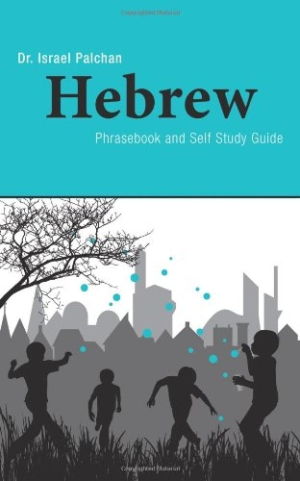
Hebrew
Phrasebook and Self-Study Guide
Going to Israel? This book can help with Hebrew phrases that apply to the real travel experience.
If you’re visiting Israel and don’t want to walk around with a bulky dictionary to help you communicate, the Hebrew: Phrasebook and Self Study Guide might be a good alternative.
When trying to communicate in a foreign country, it’s crucial to be able to ask questions. To help with this, Israel Palchan has structured his book around phrases associated with frequently asked questions related to shopping, time, health, and more. He follows this with lists of pronouns, adverbs, conjunctions, exclamations, and numbers.
If you’re an English speaker looking for Hebrew words, this book might be helpful. The problem is, if your answer comes in Hebrew and you don’t understand it, the book is unlikely to help unless you’re willing to spend time going from page to page, working backwards. That’s because the Hebrew Phrasebook is written and designed to offer English speakers a quick fix in frustrating situations. The volume is not as helpful for those trying to translate from Hebrew back into English.
If you are translating a word or phrase into Hebrew, the book does provide useful instruction by highlighting the letters to be emphasized in the pronunciation of a particular word, such as tapukhim (“apple,” emphasis on the “im”). You would need to be reminded, though, that Hebrew contains many guttural sounds, and that the transliterated words containing “kh” refer to those sounds.
Sometimes when visiting a country, you want a basic introduction to how the language works rather than a series of lessons, and in this sense, the Hebrew Phrasebook is useful. Palchan describes the Hebrew alphabet as well as the structure of singular, plural, masculine, and feminine words, and he offers English transliterations of Hebrew words, which are crucial if you’re going to pronounce those words correctly.
Many of the phrases in this book apply to real situations a traveler might face. For example, were you in the emergency room or at a doctor’s office, you could adequately express where your pain is coming from by using this book (assuming you had the presence of mind to page through it). If you already have a background in Hebrew but are feeling like your skills are rusty, this would also be a great resource to use to brush up on your long-forgotten Hebrew and put the most-often-used phrases and words at the center of your mind.
Essentially, this is a book of lists—lists of useful words for tourists; of commonly used verbs; of expressions; of different foods, hopes, and requests. At 260 pages containing over three thousand expressions and sentences, the book is too large to fit in a pocket. It also should not be confused with being a guide to learning Hebrew. Rather, it’s an on-the-spot tool for trying to communicate better in Israel’s mother tongue while you’re in that country.
Reviewed by
Lauren Kramer
Disclosure: This article is not an endorsement, but a review. The publisher of this book provided free copies of the book and paid a small fee to have their book reviewed by a professional reviewer. Foreword Reviews and Clarion Reviews make no guarantee that the publisher will receive a positive review. Foreword Magazine, Inc. is disclosing this in accordance with the Federal Trade Commission’s 16 CFR, Part 255.
